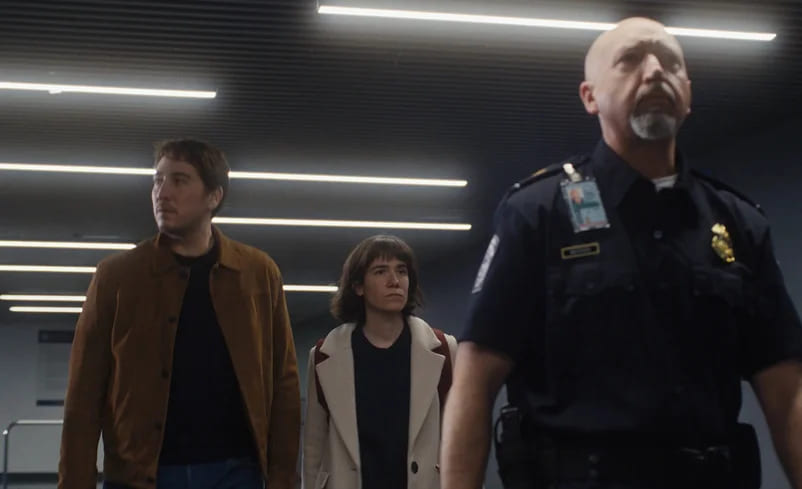In the rental – the directorial debut of cinematographer Alejandro Rosas and editor Juan Sebastian Vasque “Upon Entry”. The minimalist Spanish thriller left a powerful and sticky-unpleasant feeling on Mikhail Trofimenkov: after all, any person can find themselves in the place of his heroes.
Despite the banality of the domestic rental name of the film (original title something like “Upon Arrival”) unexpectedly accurately conveys its involuntary ambiguity. It is about not only everyday and limitless due to its internationality and impunity of bureaucratic violence, but also about the border in the literal sense of the word. In short, welcome, dear heroes and viewers, to the extraterritorial zone of the New York airport.
There are the Venezuelan urbanist Diego (Alberto Amman) and his civil wife, the Catalan dancer Elena (Brune Kuzi), who are supposed to transfer to a plane to Miami. They arrived in the U.S. on immigration visas, both seemingly decent and affluent at first glance. But a simple passport control procedure turns into a black hole of madness. And the scariest thing about this madness is that it is boundlessly realistic.
One could say that Diego and Elena found themselves in a situation similar to the protagonist of Kafka’s “The Trial” (Der Process) or Orwell’s “1984”. But despite all the references Kafka makes to the world of Austro-Hungarian bureaucracy, and Orwell’s to Soviet and/or McCarthyist practices, their texts were still phantasms, anti-utopias.
The world of “Upon Entry” is purely, depressingly documentary. Diego and Elena could rather feel like prisoners of a mini-Guantanamo, hidden in the gray corners of any airport in the world. Indeed, who among us has not felt, going through airport security, a subconscious sense of absolute helplessness before controllers who have nothing personal against their clients— only interests of state security. And whatever threat to security you may pose, there will always be one.
From a dramaturgical standpoint, the film could pass as an adaptation of some classified manual on interrogation techniques and technology. Essentially, the entire movie is an interrogation, to which the heroes are subjected either together or separately in the “additional control room” where, after confiscating their passports, they are escorted by border guard “number eighteen” who seemed the most friendly of all the staff to the neurotic Diego.
As a result, Diego and Elena find themselves in a room the size of a spacious wardrobe. There are no windows. Your phones are confiscated. There is nowhere to get food or drink. And there you will have to communicate with the changing interrogators.
It cannot be said that the “bad investigator – good investigator” scheme works here. If it did, the heroes might have an easier time: after all, in this scheme there is something almost human. But no, the interrogators are either cruel or indifferent here.
The bald African American “number eighteen”, digging through immigrants’ belongings without emotion and personally inspecting them. The canine expert, coddling a sheepdog sniffing for drugs on victims. By the way, the bald one oddly sniffs the clients’ luggage. A kind of “Elsa Koch” named Vasquez (Laura Gomez) who is even more hostile towards spouses, being herself an immigrant, and her brother is even an illegal immigrant; she, all self-righteous, has achieved her status exclusively through dogged diligence. And finally, the weary investigator, verging on Gestapo tactics, asking the heroes completely unbelievable questions.
Well, Diego has not a shameful secret, but a little secret: he was engaged in online correspondence with an American maid he never saw before Elena. But this is more his and Elena’s problem, although it arouses suspicion in him about wanting to get to the U.S. at any cost. And the unwillingness to return to Venezuela, where who knows what is happening and where he was once abducted, is obvious to everyone except American border guards who allegedly know nothing about the Venezuelan crisis.
Questions like how often spouses have intercourse, on which side of the bed Elena sleeps, and how many years, by her estimation, her parents have left to live, are beyond the bounds of, to put it mildly, reasonable interrogation. Not to mention the suggestion to Elena, almost on the verge of hysteria, to demonstrate to the interrogators some modern dance to prove her status as a ballerina. This already comes from “Night Porter”. It already seems like the sick fantasy of new Gestapo agents. But no, these are just the technologies that make us feel like fragile ice beneath the feet of a comrade major from the FBI. Or any similar structure.
In general, a very topical film. And the more topical it is, the more disgusting is the reality that spawned it.
- Review of the film “Long-Awaited Dawn” by Saverio Costanzo
- Strangers No More: How Foreigners Are Making a Difference Through Acts of Kindness
- Since March 1, Lithuania has banned the disembarkation of passengers from trains arriving from Kaliningrad
- Weather-dependent, get ready: February 23 and 24 – powerful magnetic storms
- The Polish prime minister refused to meet with Zelensky at the border


